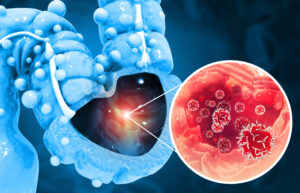
Most clinicians still have limited knowledge about colon cancer, which is extremely preventable.
Many doctors and the media will inform you that factors contributing to colon cancer include your age, the genes you acquired from your family, and a high-fat diet. They are completely mistaken. Neither your age nor your genes have much to do with colon cancer… Epigenetics, on the other hand, is the key.
Epigenetics and Your Colon
There is a crucial connection between your epigenome, which sits on top of your DNA and controls which genes are turned on and off, and the world around you. According to recent research, your genes, but not those you acquired from your parents, are the biggest causes of colon cancer. I’m talking about your epigenome impacted by your dietary choices, manner of life, and drugs you take.
I’ll explain. The largest portion of your big intestine is called your colon. It serves a variety of biological purposes, including housing the millions of bacteria that make up your gut microbiota. Beneficial bacteria known as probiotics cause the dietary fiber to ferment right here in your colon. This aids in producing substances called butyrates, which nourish colonic cells and guard against cancer. When the bacteria balance in your gut microbiota becomes unstable, and your colon ceases to function as it should, colon cancer most frequently develops.
Risk Factors Related to Colon Cancer
According to the most recent research, the three biggest – and likely most disregarded – risk factors resulting in colon cancer are:
1. Abdominal pain. A high-carb diet and excessive antibiotic usage frequently precede an imbalance in the gut flora. Over time, you develop an overabundance of cancer-promoting germs and a lack of defensive microorganisms. If left untreated, it can result in inflammatory bowel diseases like Crohn’s disease and ulcerative colitis. If you don’t take action, gut inflammation may result in colorectal cancer
2. Clostridial Difficulties (C. diff). This bacterium has been linked to colorectal cancer and can cause severe diarrheal illnesses. Though C. Studies show that while diff is frequently a natural component of a healthy gut, an imbalanced gut microbiota can lead to an increase in C. colorectal cancers brought on by several infections.
3. A lack of vitamin D. According to studies, vitamin D has a variety of effects on your epigenome. According to the findings of a sizable case-control research conducted in ten European nations, the risk of colorectal cancer significantly decreased when vitamin D blood levels rose.
Reduce Your Colon Cancer Risk
The good news is that these critical colon cancer risk factors can be significantly mitigated.
Here’s what I recommend my clients do:
• Rebalance your gut microbiome: The first step to a healthy gut is eliminating processed foods and grains with a high carbohydrate content. Lectins, nutrient blockers found in grains, disrupt the delicate balance of bacteria in the colon and interfere with digestion. Plan all of your meals instead to include high-quality protein. Your meal should be completed with fruits and vegetables rather than grains and other processed foods. One of the healthiest meals you can eat is one that includes organic fruits and vegetables and grass-fed, lean meat.
• Avoid Antibiotics: Antibiotics should be avoided since they disturb the normal balance of intestinal flora, according to numerous studies. High-strength antibiotics such cephalosporins, clindamycin, fluoroquinolone, and carbapenem provide the greatest danger. The good news is that nature has produced hundreds, if not thousands, of safe and potentially equally effective herbal antibiotic substitutes. I always recommend substituting garlic, raw honey, echinacea, and curcumin for antibiotics. Of course, there are times when a prescription is the only appropriate option.
• Raise Vitamin D levels: The best source of vitamin D is sunlight. To acquire your recommended daily allowance of vitamin D, spend no more than 20 to 30 minutes in the sun. You might need to obtain your vitamin D from additional sources, though, as we spend the majority of our time indoors. I also advise taking supplements of cholecalciferol, a type of vitamin D3. The same vitamin D that your body makes is present here. Be careful not to consume synthetic vitamin D2, also known as ergocalciferol, which is present in most multivitamins. I advise taking 5,000 IU of cholecalciferol every day.
There you have it. A few biohacks to combat colon cancer and live happily ever after.

